高中英语人教必修5 Unit 5 First Aid Learning about Language 课件(59张ppt)
文档属性
| 名称 | 高中英语人教必修5 Unit 5 First Aid Learning about Language 课件(59张ppt) |
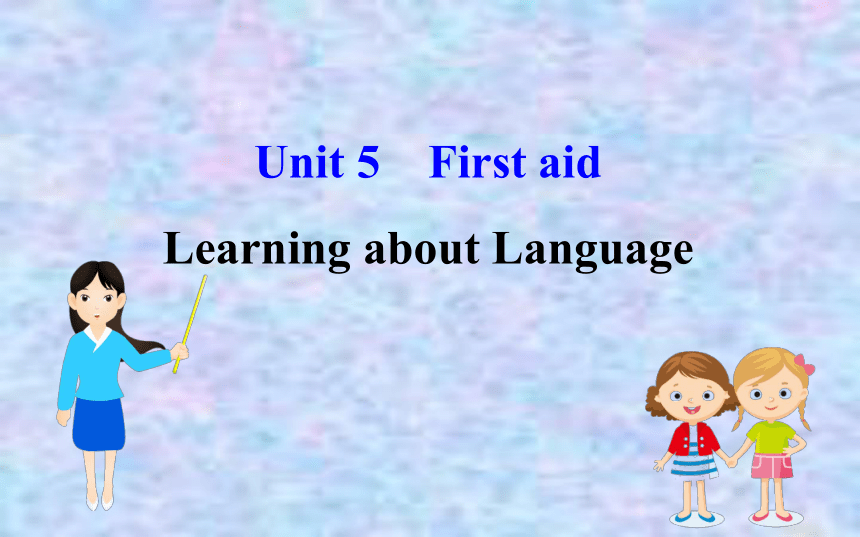
|
|
| 格式 | zip | ||
| 文件大小 | 1.4MB | ||
| 资源类型 | 教案 | ||
| 版本资源 | 人教版(新课程标准) | ||
| 科目 | 英语 | ||
| 更新时间 | 2020-03-07 00:00:00 | ||
图片预览

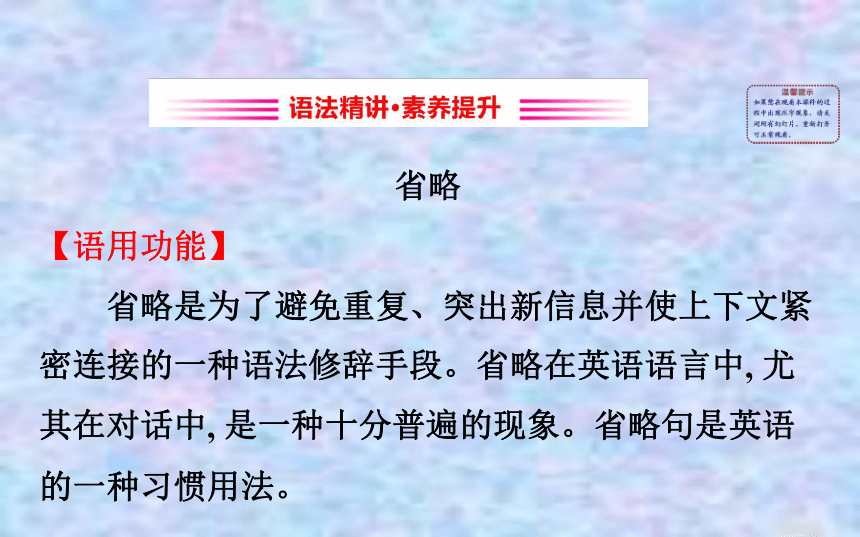
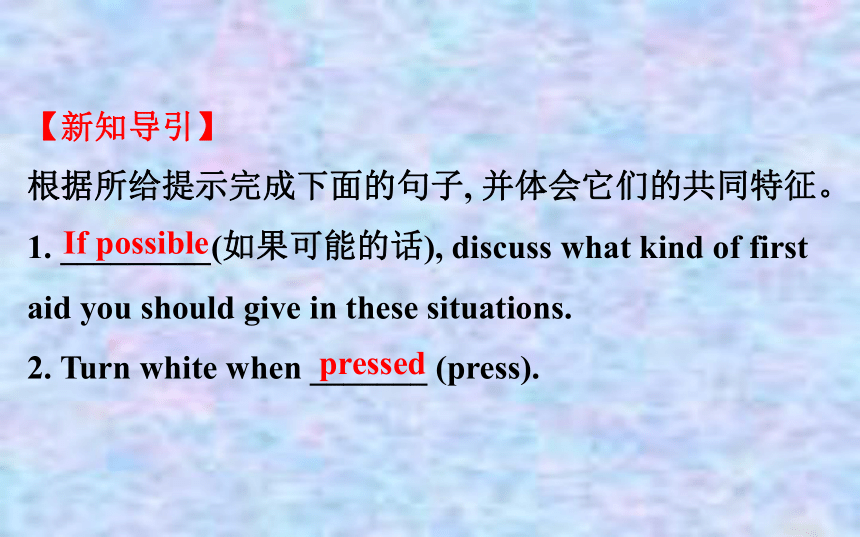
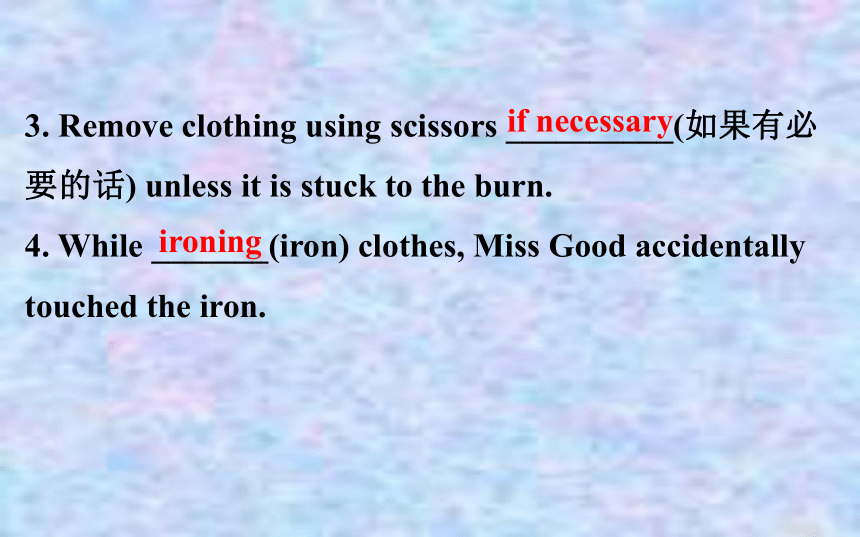
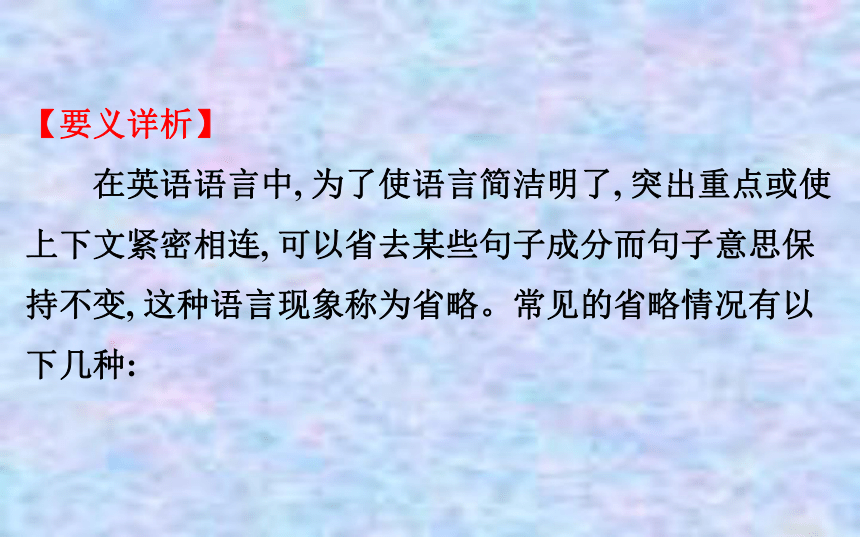

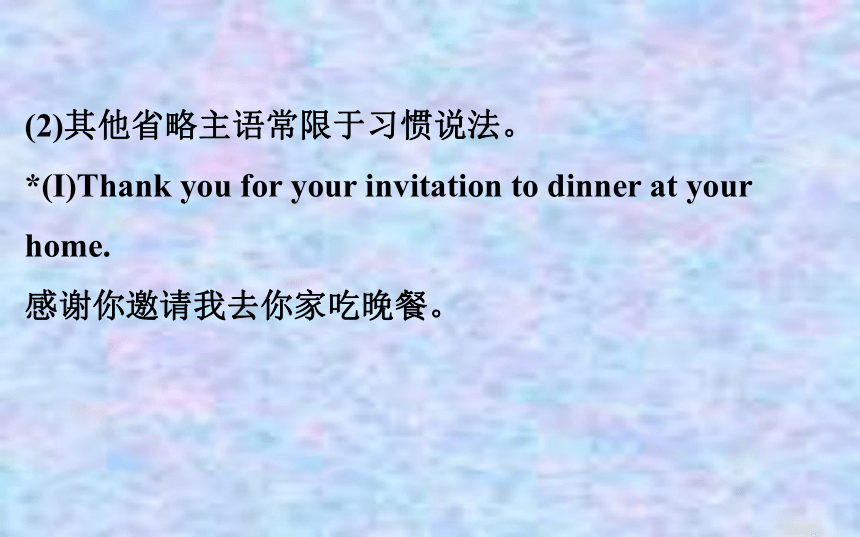


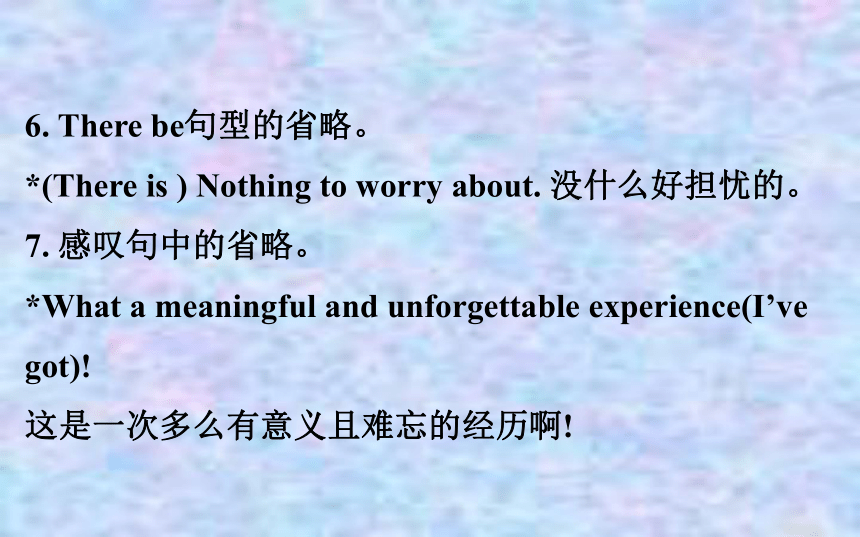
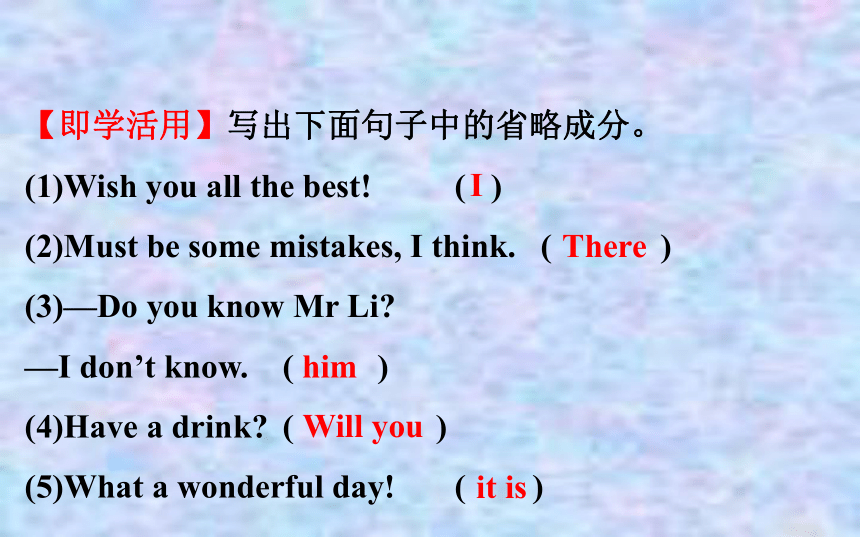
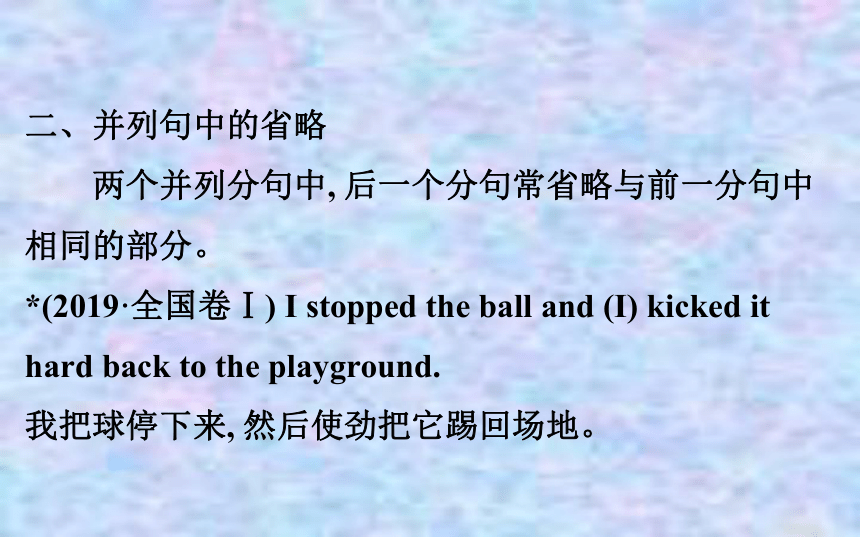
文档简介
课件59张PPT。Unit 5 First aid
Learning about Language 省略
【语用功能】
省略是为了避免重复、突出新信息并使上下文紧密连接的一种语法修辞手段。省略在英语语言中, 尤其在对话中, 是一种十分普遍的现象。省略句是英语的一种习惯用法。【新知导引】
根据所给提示完成下面的句子, 并体会它们的共同特征。
1. _________(如果可能的话), discuss what kind of first
aid you should give in these situations. ?
2. Turn white when _______ (press). If possiblepressed3. Remove clothing using scissors __________(如果有必
要的话) unless it is stuck to the burn. ?
4. While _______(iron) clothes, Miss Good accidentally
touched the iron.
if necessaryironing【要义详析】
在英语语言中, 为了使语言简洁明了, 突出重点或使上下文紧密相连, 可以省去某些句子成分而句子意思保持不变, 这种语言现象称为省略。常见的省略情况有以下几种: 一、简单句中的省略
1. 省略主语。
(1)祈使句的主语通常被省略。
*(You) Send your works to welcome2019@163. com before December 29th. 把你的作品在12月29号前发送至邮箱welcome2019@163. com。(2)其他省略主语常限于习惯说法。
*(I)Thank you for your invitation to dinner at your home.
感谢你邀请我去你家吃晚餐。2. 省略谓语。
*(Does) Anybody need help? 有人需要帮忙吗?
3. 省略宾语。
*—Have you made the decision? 你做好决定了吗?
—I haven’t made (the decision). 我还没做决定。4. 省略主语和谓语(或谓语的一部分), 只剩下表语、宾语、状语或其他成分。
*(Are you) Tired? 累了吗?
*(You come) This way, please. 请这边走。
5. 省略表语。
*—Are you ready? 你准备好了吗?
—Yes, I am (ready). 是的, 我准备好了。6. There be句型的省略。
*(There is ) Nothing to worry about. 没什么好担忧的。
7. 感叹句中的省略。
*What a meaningful and unforgettable experience(I’ve got)!
这是一次多么有意义且难忘的经历啊! 【即学活用】写出下面句子中的省略成分。
(1)Wish you all the best! ( )
(2)Must be some mistakes, I think. ( )
(3)—Do you know Mr Li?
—I don’t know. ( )
(4)Have a drink? ( )
(5)What a wonderful day! ( )ITherehimWill youit is二、并列句中的省略
两个并列分句中, 后一个分句常省略与前一分句中相同的部分。
*(2019·全国卷Ⅰ) I stopped the ball and (I) kicked it hard back to the playground.
我把球停下来, 然后使劲把它踢回场地。*Wise men have their mouth in their heart, and fools (have) their heart in their mouth.
智者嘴在心里, 蠢人心在嘴边。
【即学活用】写出省略的部分
(1)The scenery was beautiful, and the acting superb.
( )
(2)Hope you could come to China again and have a
wonderful time with us. ( )wasI, you(3) I study at college and my sister at high school.
( )
(4)I can’t see you today, but I can tomorrow. ( )
studiessee you三、复合句中的省略
1. 状语从句的省略。
在时间、条件、让步、方式等状语从句中, 如果从句和主句的主语一致或从句主语为it, 且从句谓语为be动词时, 可省略从句的主语和be动词。(1)从属连词+形容词。
*I try to offer some advice to my friends when (it is) necessary. 必要的时候, 我会尽力给朋友们提供一些建议。
*Though (they are) hard to maintain, green spaces in cities bring abundant rewards.
尽管难以保持, 城市绿地会带来丰厚的回报。*If (it is) possible, I hope to apply for University College London after graduation.
如果可能的话, 我希望毕业后申请伦敦大学。
(2)从属连词+副词。
*While (he is) there, Miguel has an unforgettable and
adventurous night.
在那里的时候, Miguel度过了难忘而又惊险的一夜。
(3)从属连词+名词。
*Though (he is) a young man, he has made several
inventions. 虽然年轻, 但是他已经有好几项发明了。(4)从属连词+介词短语。
*(2019·天津高考)While (we were) on land, we killed off large predators such as wolves.
在陆地上的时候, 我们杀死了像狼这样的大型食肉动物。(5)从属连词+现在分词。
*(2019·全国卷Ⅲ)It is impossible not to talk about China as the leading player when discussing fashion.
在谈论时尚的时候, 不可能不提到作为引领者的中国。(6)从属连词+过去分词。
*If (I am) given the opportunity, I’ll be glad to work for our city and surely devoted to the job. 如果被给予这次机会, 我将很高兴为我们的城市工作, 并致力于这个工作。(7)从属连词+动词不定式。
*He wouldn’t solve the difficult problem even if (he were) to take charge. 即使他来负责, 也解决不了这个难题。【名师点津】
省略句中非谓语动词的选用要根据动词和主语的逻辑关系: 主动关系→现在分词; 被动关系→过去分词; 尚未发生→动词不定式【知识延伸】
当虚拟语气用于状语从句时, 若条件状语从句中有were, had, should时, 可省略if, 把它们提至句首, 形成倒装句。
*If I were a teacher, I would be strict with my students.
=Were I a teacher, I would be strict with my students.
如果我是一位老师, 我会对学生严格要求。*If he had followed my advice, he wouldn’t have lost his job.
=Had he followed my advice, he wouldn’t have lost his job. 如果他采纳我的建议, 他就不会失去工作了。*If your computer should break down within the first year, we would repair it for free.
=Should your computer break down within the first year, we would repair it for free.
如果你的电脑在第一年内出毛病, 我们将免费维修。
【即学活用】用省略句完成句子
(1)(2019·北京高考) ______ ________, I realised how hard it was to work in the fields under a hot sun.
工作的时候, 我意识到烈日炎炎之下在田地里劳作是多么辛苦。Whileworking(2) __ __________, could you please send us the detailed
arrangement of all the activities?
如果方便的话, 您能发给我们所有活动的详细安排吗?
(3) ___ _________, we covered our mouths and noses with
wet towels. 按照指示, 我们用湿毛巾捂住了嘴和鼻子。IfconvenientAsinstructed(4) __ __, we’ll find that online shopping has more advantages than disadvantages.
如果这样的话, 我们将会发现网上购物的优点多于缺点。Ifso2. 宾语从句的省略。
(1)由which, when, where, how 和 why 引导的宾语从句, 若从句中表达的内容与主句内容重复, 可将其省略, 仅保留疑问词。
*You were late again, and I hope you will explain why (you were late again). 你又迟到了, 我希望你能解释一下为什么。(2)在that引导的宾语从句中, 可省略引导词that; 若两个或两个以上的that引导的宾语从句作动词的宾语, 只能省略第一个引导词that。
*I’m sorry to learn (that) you didn’t do well in that exam and that you are very worried about your study.
很抱歉得知你考试不理想, 并且你对自己的学习很担忧。(3)suggest, insist, order, require等表示建议、要求、命令的动词后接的名词性从句中, 谓语动词常用“should+动词原形”, should可以省略。
*(2019·北京高考) I suggest that you (should) begin from Beijing, and I’ll show you around.
我建议你从北京开始, 我会领着你参观。(4)为了避免重复前面所说过的内容, 替代词so/not替代肯定或否定的名词性从句。可与believe, do, expect, fear, guess, hope, say, speak, suppose, think, I’m afraid等连用。so表示赞同前述的事实, not表示不赞同前述的事实。*80% of the students think it necessary to read English classics, while 20% of the students don’t think so.
80%的学生认为阅读英文经典是必要的, 而20%的学生不这样认为。
3. 定语从句的省略。
(1)关系代词that, which, who, whom 在限制性定语从句中作宾语, 前无介词时可省略。
*You are a special teacher (whom) I will always remember forever.
你是一位特别的老师, 我将永远记住您。*She listens attentively and tries to catch everything (that) the teacher says in class.
她听得很认真, 并且尽力记住老师在课堂上所说的每一句话。(2)在定语从句中way作先行词, 且在句中充当方式状语时, 可省略引导定语从句的关系代词。
*(2019·浙江高考)However, when she hung up, she regretted the way (that/in which) she had handled the call.
然而, 当她挂断电话的时候, 她对接电话的方式感到后悔了。【即学活用】用省略句完成句子
(1) ____________________________left a lasting
impression on me. 所有我看到和体验到的给我留下了
持久的印象。?
(2)The doctor suggested that ____________________for
three days. 医生建议我卧床三天。?All (that) I saw and experiencedI (should) stay in bed(3)More importantly, there are teachers online _______
_____________________更为重要的是, 有在线老师供
你求助。?
(whom)you can turn to for help.四、动词不定式的省略
1. 当主语中有实义动词do的某种形式时, 作表语的不定式可省略to。
*What we are supposed to do is (to) help prepare for the Spring Festival.
我们应该做的就是帮忙为春节做准备。2. 两个或多个不定式短语表示并列关系时, 后面不定式短语的不定式符号to通常被省略; 如果表示对比关系, 则不定式中的不定式符号to通常要保留。
*If you want to improve your English and (to)make your life more colorful, join us! 如果你想提高你的英语, 并使你的生活更丰富多彩, 加入我们吧! *I haven’t decided whether to go camping or to stay at home.
我还没决定是去露营还是待在家里。
3. 感官动词see, watch, notice, observe, hear, feel, listen to等以及使役动词let, make, have之后作宾语补足语的不定式要省略to, 但是用于被动时, to要保留。
*I heard her sing an English song just now.
刚才我听到她唱了一首英文歌。*Taking a train makes people have enough time to get to know a lot of new friends.
坐火车使人有足够的时间去认识一些新朋友。
*Tom was made to wait for half an hour.
汤姆被迫等了半个小时。4. 若前面出现过相同的动词, 后面的不定式常省略动词原形, 而不定式符号to应该保留。
*I asked him to stay here, but he refused to (stay).
我让他留在这里, 但是他拒绝了。【知识延伸】
(1)如果不定式符号to后有have或be动词时, 则需保留。
*Though Jack isn’t a driver, he used to be (a driver).
虽然杰克现在不是司机, 但他曾经是。*—Did you watch the movie last night?
你昨晚去看电影了吗?
—I’d like to have (watched the movie), but a friend came to visit me. 我本来想去, 但一个朋友来拜访我。(2)动词不定式在动词believe, find, think, feel, consider, imagine, prove等后作宾语补足语时, to be+n. /adj. 中的to be可以省略。
*I consider him (to be) lazy. 我认为他懒。
*His mother found him (to be) a clever boy.
他母亲发觉他是一个很聪明的男孩。(3)在cannot but, cannot choose but, cannot help but之后
的动词不定式一般不带to; but之前有实义动词do的某种
形式do, does, did, done 时, 也不带to, 否则要带to。
*We have nothing to do now but wait.
我们现在除了等没有别的事可做。
*He has no choice but to accept the fact.
除了接受这个事实他别无选择。【即学活用】
(1)语法填空
①Someone was heard _______(come) up the stairs. ?
②I have nothing to do but ___ (get) up the courage to
cope with my new situation.
③ I had no other choice but _____(try) sending them
a text message in class. ?to comegetto try(2)You can take a bus or subway to nearly anywhere
___________. ?
你可以坐公交或地铁到你想去的任何地方。 you want to五、介词的省略
1. 英语中某些短语或句式中的介词常省略, 常用短语有: be busy (in) doing sth. , prevent/stop sb. /sth. (from) doing sth. , waste time (in) doing sth. , have a good/hard time (in) doing sth. 等; 常用句式有: spend time/money (in) doing sth. , have difficulty/trouble (in) doing sth. , It’s no use/good (in) doing sth. 等。*On the one hand, I am busy(in) preparing for the coming exams. 一方面, 我忙于为即将到来的考试做准备。
*I wonder if you could give me some advice because I have trouble (in )studying English.
我想知道你是否可以给我一些建议, 因为我学英语有困难。2. 表示时间的介词at, on和in在next, last, this, these,
yesterday, every等词之前, 一般可以省略。
*There will be a Beijing opera performance held in a
theater this weekend. 这个周末将有一场京剧表演在剧
院举行。
*I expect (that) you will come and enjoy the festival next
year. 我期望你明年能来享受这个节日。【知识延伸】
在表达“阻止某人做某事”时, 若用动词prevent和stop, 介词from可以省略; 但若用keep, from则不能省略。如果这三个动词用于被动语态, 那么from都不能省略。* You can look into the case and take some measures to prevent such things (from) happening again.
你可以调查一下这个情况, 并采取一些措施阻止这种事情再次发生。
【即学活用】(1)语法填空
①It’s hard to prevent them _____(use) the Internet for
recreation.
②During the summer vacation, I had a good time
_______(stay) in the countryside with my grandparents.
③I’ll spend more time _______(talk) with my family
about my study. usingstayingtalking(2)As you know, CRH has developed rapidly __________
________. ?
正如你知道的那样, 这些年中国高铁发展迅速。these yearsin China
Learning about Language 省略
【语用功能】
省略是为了避免重复、突出新信息并使上下文紧密连接的一种语法修辞手段。省略在英语语言中, 尤其在对话中, 是一种十分普遍的现象。省略句是英语的一种习惯用法。【新知导引】
根据所给提示完成下面的句子, 并体会它们的共同特征。
1. _________(如果可能的话), discuss what kind of first
aid you should give in these situations. ?
2. Turn white when _______ (press). If possiblepressed3. Remove clothing using scissors __________(如果有必
要的话) unless it is stuck to the burn. ?
4. While _______(iron) clothes, Miss Good accidentally
touched the iron.
if necessaryironing【要义详析】
在英语语言中, 为了使语言简洁明了, 突出重点或使上下文紧密相连, 可以省去某些句子成分而句子意思保持不变, 这种语言现象称为省略。常见的省略情况有以下几种: 一、简单句中的省略
1. 省略主语。
(1)祈使句的主语通常被省略。
*(You) Send your works to welcome2019@163. com before December 29th. 把你的作品在12月29号前发送至邮箱welcome2019@163. com。(2)其他省略主语常限于习惯说法。
*(I)Thank you for your invitation to dinner at your home.
感谢你邀请我去你家吃晚餐。2. 省略谓语。
*(Does) Anybody need help? 有人需要帮忙吗?
3. 省略宾语。
*—Have you made the decision? 你做好决定了吗?
—I haven’t made (the decision). 我还没做决定。4. 省略主语和谓语(或谓语的一部分), 只剩下表语、宾语、状语或其他成分。
*(Are you) Tired? 累了吗?
*(You come) This way, please. 请这边走。
5. 省略表语。
*—Are you ready? 你准备好了吗?
—Yes, I am (ready). 是的, 我准备好了。6. There be句型的省略。
*(There is ) Nothing to worry about. 没什么好担忧的。
7. 感叹句中的省略。
*What a meaningful and unforgettable experience(I’ve got)!
这是一次多么有意义且难忘的经历啊! 【即学活用】写出下面句子中的省略成分。
(1)Wish you all the best! ( )
(2)Must be some mistakes, I think. ( )
(3)—Do you know Mr Li?
—I don’t know. ( )
(4)Have a drink? ( )
(5)What a wonderful day! ( )ITherehimWill youit is二、并列句中的省略
两个并列分句中, 后一个分句常省略与前一分句中相同的部分。
*(2019·全国卷Ⅰ) I stopped the ball and (I) kicked it hard back to the playground.
我把球停下来, 然后使劲把它踢回场地。*Wise men have their mouth in their heart, and fools (have) their heart in their mouth.
智者嘴在心里, 蠢人心在嘴边。
【即学活用】写出省略的部分
(1)The scenery was beautiful, and the acting superb.
( )
(2)Hope you could come to China again and have a
wonderful time with us. ( )wasI, you(3) I study at college and my sister at high school.
( )
(4)I can’t see you today, but I can tomorrow. ( )
studiessee you三、复合句中的省略
1. 状语从句的省略。
在时间、条件、让步、方式等状语从句中, 如果从句和主句的主语一致或从句主语为it, 且从句谓语为be动词时, 可省略从句的主语和be动词。(1)从属连词+形容词。
*I try to offer some advice to my friends when (it is) necessary. 必要的时候, 我会尽力给朋友们提供一些建议。
*Though (they are) hard to maintain, green spaces in cities bring abundant rewards.
尽管难以保持, 城市绿地会带来丰厚的回报。*If (it is) possible, I hope to apply for University College London after graduation.
如果可能的话, 我希望毕业后申请伦敦大学。
(2)从属连词+副词。
*While (he is) there, Miguel has an unforgettable and
adventurous night.
在那里的时候, Miguel度过了难忘而又惊险的一夜。
(3)从属连词+名词。
*Though (he is) a young man, he has made several
inventions. 虽然年轻, 但是他已经有好几项发明了。(4)从属连词+介词短语。
*(2019·天津高考)While (we were) on land, we killed off large predators such as wolves.
在陆地上的时候, 我们杀死了像狼这样的大型食肉动物。(5)从属连词+现在分词。
*(2019·全国卷Ⅲ)It is impossible not to talk about China as the leading player when discussing fashion.
在谈论时尚的时候, 不可能不提到作为引领者的中国。(6)从属连词+过去分词。
*If (I am) given the opportunity, I’ll be glad to work for our city and surely devoted to the job. 如果被给予这次机会, 我将很高兴为我们的城市工作, 并致力于这个工作。(7)从属连词+动词不定式。
*He wouldn’t solve the difficult problem even if (he were) to take charge. 即使他来负责, 也解决不了这个难题。【名师点津】
省略句中非谓语动词的选用要根据动词和主语的逻辑关系: 主动关系→现在分词; 被动关系→过去分词; 尚未发生→动词不定式【知识延伸】
当虚拟语气用于状语从句时, 若条件状语从句中有were, had, should时, 可省略if, 把它们提至句首, 形成倒装句。
*If I were a teacher, I would be strict with my students.
=Were I a teacher, I would be strict with my students.
如果我是一位老师, 我会对学生严格要求。*If he had followed my advice, he wouldn’t have lost his job.
=Had he followed my advice, he wouldn’t have lost his job. 如果他采纳我的建议, 他就不会失去工作了。*If your computer should break down within the first year, we would repair it for free.
=Should your computer break down within the first year, we would repair it for free.
如果你的电脑在第一年内出毛病, 我们将免费维修。
【即学活用】用省略句完成句子
(1)(2019·北京高考) ______ ________, I realised how hard it was to work in the fields under a hot sun.
工作的时候, 我意识到烈日炎炎之下在田地里劳作是多么辛苦。Whileworking(2) __ __________, could you please send us the detailed
arrangement of all the activities?
如果方便的话, 您能发给我们所有活动的详细安排吗?
(3) ___ _________, we covered our mouths and noses with
wet towels. 按照指示, 我们用湿毛巾捂住了嘴和鼻子。IfconvenientAsinstructed(4) __ __, we’ll find that online shopping has more advantages than disadvantages.
如果这样的话, 我们将会发现网上购物的优点多于缺点。Ifso2. 宾语从句的省略。
(1)由which, when, where, how 和 why 引导的宾语从句, 若从句中表达的内容与主句内容重复, 可将其省略, 仅保留疑问词。
*You were late again, and I hope you will explain why (you were late again). 你又迟到了, 我希望你能解释一下为什么。(2)在that引导的宾语从句中, 可省略引导词that; 若两个或两个以上的that引导的宾语从句作动词的宾语, 只能省略第一个引导词that。
*I’m sorry to learn (that) you didn’t do well in that exam and that you are very worried about your study.
很抱歉得知你考试不理想, 并且你对自己的学习很担忧。(3)suggest, insist, order, require等表示建议、要求、命令的动词后接的名词性从句中, 谓语动词常用“should+动词原形”, should可以省略。
*(2019·北京高考) I suggest that you (should) begin from Beijing, and I’ll show you around.
我建议你从北京开始, 我会领着你参观。(4)为了避免重复前面所说过的内容, 替代词so/not替代肯定或否定的名词性从句。可与believe, do, expect, fear, guess, hope, say, speak, suppose, think, I’m afraid等连用。so表示赞同前述的事实, not表示不赞同前述的事实。*80% of the students think it necessary to read English classics, while 20% of the students don’t think so.
80%的学生认为阅读英文经典是必要的, 而20%的学生不这样认为。
3. 定语从句的省略。
(1)关系代词that, which, who, whom 在限制性定语从句中作宾语, 前无介词时可省略。
*You are a special teacher (whom) I will always remember forever.
你是一位特别的老师, 我将永远记住您。*She listens attentively and tries to catch everything (that) the teacher says in class.
她听得很认真, 并且尽力记住老师在课堂上所说的每一句话。(2)在定语从句中way作先行词, 且在句中充当方式状语时, 可省略引导定语从句的关系代词。
*(2019·浙江高考)However, when she hung up, she regretted the way (that/in which) she had handled the call.
然而, 当她挂断电话的时候, 她对接电话的方式感到后悔了。【即学活用】用省略句完成句子
(1) ____________________________left a lasting
impression on me. 所有我看到和体验到的给我留下了
持久的印象。?
(2)The doctor suggested that ____________________for
three days. 医生建议我卧床三天。?All (that) I saw and experiencedI (should) stay in bed(3)More importantly, there are teachers online _______
_____________________更为重要的是, 有在线老师供
你求助。?
(whom)you can turn to for help.四、动词不定式的省略
1. 当主语中有实义动词do的某种形式时, 作表语的不定式可省略to。
*What we are supposed to do is (to) help prepare for the Spring Festival.
我们应该做的就是帮忙为春节做准备。2. 两个或多个不定式短语表示并列关系时, 后面不定式短语的不定式符号to通常被省略; 如果表示对比关系, 则不定式中的不定式符号to通常要保留。
*If you want to improve your English and (to)make your life more colorful, join us! 如果你想提高你的英语, 并使你的生活更丰富多彩, 加入我们吧! *I haven’t decided whether to go camping or to stay at home.
我还没决定是去露营还是待在家里。
3. 感官动词see, watch, notice, observe, hear, feel, listen to等以及使役动词let, make, have之后作宾语补足语的不定式要省略to, 但是用于被动时, to要保留。
*I heard her sing an English song just now.
刚才我听到她唱了一首英文歌。*Taking a train makes people have enough time to get to know a lot of new friends.
坐火车使人有足够的时间去认识一些新朋友。
*Tom was made to wait for half an hour.
汤姆被迫等了半个小时。4. 若前面出现过相同的动词, 后面的不定式常省略动词原形, 而不定式符号to应该保留。
*I asked him to stay here, but he refused to (stay).
我让他留在这里, 但是他拒绝了。【知识延伸】
(1)如果不定式符号to后有have或be动词时, 则需保留。
*Though Jack isn’t a driver, he used to be (a driver).
虽然杰克现在不是司机, 但他曾经是。*—Did you watch the movie last night?
你昨晚去看电影了吗?
—I’d like to have (watched the movie), but a friend came to visit me. 我本来想去, 但一个朋友来拜访我。(2)动词不定式在动词believe, find, think, feel, consider, imagine, prove等后作宾语补足语时, to be+n. /adj. 中的to be可以省略。
*I consider him (to be) lazy. 我认为他懒。
*His mother found him (to be) a clever boy.
他母亲发觉他是一个很聪明的男孩。(3)在cannot but, cannot choose but, cannot help but之后
的动词不定式一般不带to; but之前有实义动词do的某种
形式do, does, did, done 时, 也不带to, 否则要带to。
*We have nothing to do now but wait.
我们现在除了等没有别的事可做。
*He has no choice but to accept the fact.
除了接受这个事实他别无选择。【即学活用】
(1)语法填空
①Someone was heard _______(come) up the stairs. ?
②I have nothing to do but ___ (get) up the courage to
cope with my new situation.
③ I had no other choice but _____(try) sending them
a text message in class. ?to comegetto try(2)You can take a bus or subway to nearly anywhere
___________. ?
你可以坐公交或地铁到你想去的任何地方。 you want to五、介词的省略
1. 英语中某些短语或句式中的介词常省略, 常用短语有: be busy (in) doing sth. , prevent/stop sb. /sth. (from) doing sth. , waste time (in) doing sth. , have a good/hard time (in) doing sth. 等; 常用句式有: spend time/money (in) doing sth. , have difficulty/trouble (in) doing sth. , It’s no use/good (in) doing sth. 等。*On the one hand, I am busy(in) preparing for the coming exams. 一方面, 我忙于为即将到来的考试做准备。
*I wonder if you could give me some advice because I have trouble (in )studying English.
我想知道你是否可以给我一些建议, 因为我学英语有困难。2. 表示时间的介词at, on和in在next, last, this, these,
yesterday, every等词之前, 一般可以省略。
*There will be a Beijing opera performance held in a
theater this weekend. 这个周末将有一场京剧表演在剧
院举行。
*I expect (that) you will come and enjoy the festival next
year. 我期望你明年能来享受这个节日。【知识延伸】
在表达“阻止某人做某事”时, 若用动词prevent和stop, 介词from可以省略; 但若用keep, from则不能省略。如果这三个动词用于被动语态, 那么from都不能省略。* You can look into the case and take some measures to prevent such things (from) happening again.
你可以调查一下这个情况, 并采取一些措施阻止这种事情再次发生。
【即学活用】(1)语法填空
①It’s hard to prevent them _____(use) the Internet for
recreation.
②During the summer vacation, I had a good time
_______(stay) in the countryside with my grandparents.
③I’ll spend more time _______(talk) with my family
about my study. usingstayingtalking(2)As you know, CRH has developed rapidly __________
________. ?
正如你知道的那样, 这些年中国高铁发展迅速。these yearsin China
